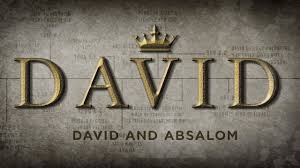David Battles Absalom
Second Samuel 17:24 to 19:8a

David’s army and Absalom’s army were about to engage in a battle that neither one would win, but both could lose. If David won, it meant the death of his son Absalom and his friend Ahithophel; if Absalom won, it would mean the death of his father and other members of his family. It was a no-win situation. No matter how it came out, he was going to be in pain.435
Just as in the earlier narrative an adversary of David (Shim’i) curses him (Second Samuel 16:5-14), so also here an adversary of David (Absalom) opposed him in battle (Second Samuel 18:6-8); just as in the earlier account David demands that Shim’i be spared (Second Samuel 16:11), so here David demands that Absalom be spared (Second Samuel 18:5 and 12); and just as in the earlier episode a son of Zeruiah (Abishai) is ready to kill Shim’i (Second Samuel 16:9), so also here a son of Zeruiah (Joab [verse 21]) is ready to kill Absalom – and indeed mortally wounds him (Second Samuel 18:14-15).
By the end of this section David is a wreck because of Absalom’s death. Incapable of governing, Joab had to step in and take charge or David might have even lost his authority to rule. I do not doubt that deep natural affection played its part. But there was an even deeper dimension to David’s grief. As we must use Second Samuel 17:14b to control our overall view of 18:1 to 19:8, we must also allow 12:10-12 to shed a light on David’s sorrow. How Nathan’s words must have echoed in David’s conscience: The sword will never depart from your house. It was David’s guilt that inflamed his grief. Nathan had assured David that he would not die but that his infant son would die (Second Samuel 12:14). And his infant son did die. Then Amnon was murdered (2 Samuel 13), and now Absalom was gone.
David knew that his sin had set the sword in motion. If only I had died instead of you! Though David’s sin brought consequences. . . yet Absalom suffered the consequences of his own sinful heart. There was that time when unlike his chesed-ways with Mephibosheth (Second Samuel 9) and Hanun (Second Samuel 10), David acted as the king without chesed or pity (Second Samuel 12:6) because he wanted sex with Bathsheba and didn’t blink at having Uriah murdered. Perhaps David wished he had died instead of Absalom because he knew he deserved to die. Guilt had magnified his grief. So we end with a paradox: a safe Kingdom and a despondent king. Maybe there’s a reason why, at the last, ADONAI Himself must wipe away every tear from our eyes (Isaiah 25:8; Revelation 21:4).
First and Second Samuel clearly show us that as the anointed king, David was a suffering servant. Here, however, he sheds tears for his own griefs and over his own guilt. But David and we, will have to wait for his Descendant, the Lion of the Tribe of Judah, to return again (see the commentary on Isaiah, to see link click Kg – The Second Coming of Jesus Christ to Bozrah) and inaugurate His thousand year reign of peace from the Temple in Yerushalayim (see the commentary on Revelation Fh – The Dispensation of the Messianic Kingdom).



Leave A Comment